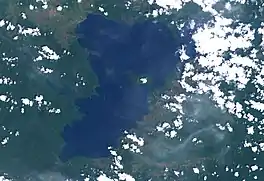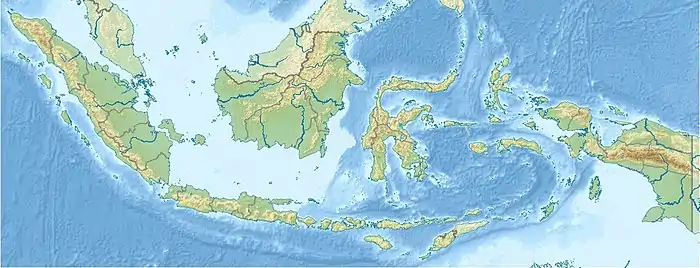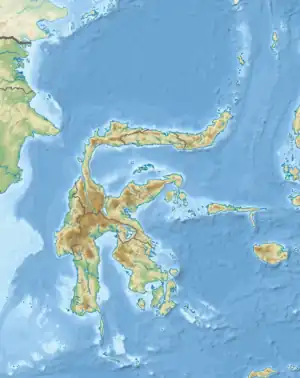Lake Towuti
Lake Towuti (Indonesian: Danau Towuti) is a lake in East Luwu Regency, South Sulawesi province, Indonesia. Surrounded by mountains, it is the largest lake of the island of Sulawesi and one of the five lakes of the Malili Lake system (the other being Matano, and the small Mahalona, Masapi and Lontoa (Wawantoa)).[1] A river flows from the lake to the Boni Bay. The town Laronda is located on its shore.
| Towuti | |
|---|---|
 | |
 Towuti  Towuti | |
| Location | South Sulawesi, Indonesia |
| Coordinates | 2°45′0″S 121°30′0″E |
| Type | Tectonic |
| Basin countries | Indonesia |
| Surface area | 561.1 km2 (216.6 sq mi) |
| Average depth | 120 m (390 ft) |
| Max. depth | 203 m (666 ft) |
| Water volume | 67.33 km3 (16.15 cu mi) |
| Surface elevation | 293 m (961 ft) |

Ecology
Together with the other lakes in the Malili Lake system, Towuti has a large number of endemic fishes (Telmatherinid sail-fin silversides, Glossogobius and Mugilogobius gobies, Nomorhamphus halfbeaks and Oryzias ricefishes), Caridina shrimps, Parathelphusid crabs (Nautilothelphusa, Parathelphusa and Syntripsa) and Tylomelania snails.[1][2][3]
Among these, Caridina spongicola lives on freshwater sponges, making it one of only two known commensal species of freshwater shrimp (the other is a Limnocaridina shrimp that lives in mussels in Lake Tanganyika, East Africa).[4][5]
See also
References
- Gray, S.M., and J.S. McKinnon (2006). A comparative description of mating behaviour in the endemic telmatherinid fishes of Sulawesi's Malili Lakes. Environmental Biology of Fishes 75: 471–482
- von Rintelen, K., and Y. Cai (2009). Radiation of endemic species flocks in ancient lakes: systematic revision of the freshwater shrimp Caridina H. Milne Edwards, 1837 (Crustacea: Decapoda: Atyidae) from the ancient lakes of Sulawesi, Indonesia, with the description of eight new species. Raffles Bulletin of Zoology 57: 343-452.
- von Rintelen, T., K. von Rintelen, M. Glaubrecht, C.D. Schubart, and F. Herder (2012). Aquatic biodiversity hotspots in Wallacea: the species flocks in the ancient lakes of Sulawesi, Indonesia. pp. 290-315 in: Gower, D.J., K.G. Johnson, J.E. Richardson, B.R. Rosen, L. Rüber, and S.T. Williams, S.T., eds (2012). Biotic evolution and environmental change in southeast Asia.Cambridge University Press, Cambridge. ISBN 9781107001305
- De Grave, S.; Cai, Y.; Amnker, A. (2008). "Global diversity of shrimps (Crustacea: Decapoda: Caridea) in freshwater". Hydrobiologia. 595: 287–293. doi:10.1007/s10750-007-9024-2. S2CID 22945163.
- von Rintelen; von Rintelen; Meixner; Lüter; Cai; Glaubrecht (2007). "Freshwater shrimp–sponge association from an ancient lake". Biol Lett. 3 (3): 262–264. doi:10.1098/rsbl.2006.0613. PMC 2464681. PMID 17347103.